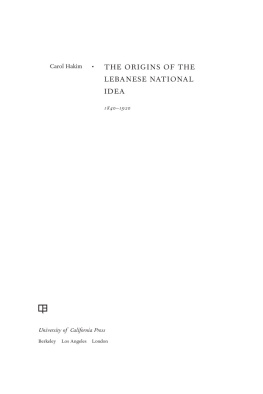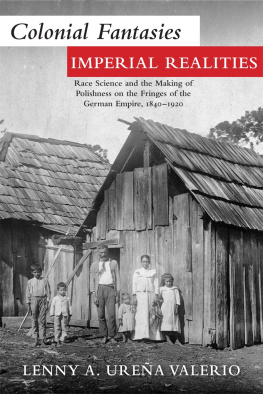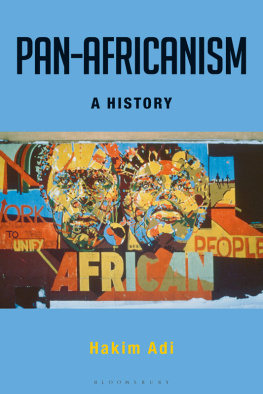Hakim - The origins of the Lebanese national idea, 1840-1920
Here you can read online Hakim - The origins of the Lebanese national idea, 1840-1920 full text of the book (entire story) in english for free. Download pdf and epub, get meaning, cover and reviews about this ebook. City: Berkeley;Libanon története, year: 2013, publisher: University of California Press, genre: Politics. Description of the work, (preface) as well as reviews are available. Best literature library LitArk.com created for fans of good reading and offers a wide selection of genres:
Romance novel
Science fiction
Adventure
Detective
Science
History
Home and family
Prose
Art
Politics
Computer
Non-fiction
Religion
Business
Children
Humor
Choose a favorite category and find really read worthwhile books. Enjoy immersion in the world of imagination, feel the emotions of the characters or learn something new for yourself, make an fascinating discovery.
The origins of the Lebanese national idea, 1840-1920: summary, description and annotation
We offer to read an annotation, description, summary or preface (depends on what the author of the book "The origins of the Lebanese national idea, 1840-1920" wrote himself). If you haven't found the necessary information about the book — write in the comments, we will try to find it.
Hakim: author's other books
Who wrote The origins of the Lebanese national idea, 1840-1920? Find out the surname, the name of the author of the book and a list of all author's works by series.
The origins of the Lebanese national idea, 1840-1920 — read online for free the complete book (whole text) full work
Below is the text of the book, divided by pages. System saving the place of the last page read, allows you to conveniently read the book "The origins of the Lebanese national idea, 1840-1920" online for free, without having to search again every time where you left off. Put a bookmark, and you can go to the page where you finished reading at any time.
Font size:
Interval:
Bookmark:

THE ORIGINS OF THE LEBANESE NATIONAL IDEA
The publisher gratefully acknowledges the generous support of the Ahmanson Foundation Humanities Endowment Fund of the University of California Press Foundation.
The publisher also gratefully acknowledges the generous support of the Humanities Endowment Fund of the University of California Press Foundation.
Carol Hakim | THE ORIGINS OF THE |
LEBANESE NATIONAL | |
IDEA | |
18401920 |

University of California Press
BerkeleyLos AngelesLondon
University of California Press, one of the most distinguished university presses in the United States, enriches lives around the world by advancing scholarship in the humanities, social sciences, and natural sciences. Its activities are supported by the UC Press Foundation and by philanthropic contributions from individuals and institutions. For more information, visit www.ucpress.edu.
University of California Press
Berkeley and Los Angeles, California
University of California Press, Ltd.
London, England
2013 by The Regents of the University of California
Library of Congress Cataloging-in-Publication Data
Hakim, Carol, 1954
The origins of the Lebanese national idea, 18401920 / Carol Hakim.
p. cm.
Includes bibliographical references and index.
ISBN 978-0-520-27341-2 (cloth: alk. paper)
eISBN 9780520954717
1. LebanonPolitics and government19th century. 2. LebanonPolitics and government20th century. 3. Mount Lebanon (Lebanon: Province)Politics and government. 4. NationalismLebanonHistory. 5. Elite (Social sciences)Political activityLebanonHistory. 6. Political cultureLebanonHistory. 7. MaronitesLebanonHistory. 8. DruzesLebanonHistory. 9. LebanonEthnic relationsHistory. I. Title.
DS85.H35 2013
956.92 034dc23
2012023406
Manufactured in the United States of America
22 21 20 19 18 17 16 15 14 13
10 9 8 7 6 5 4 3 2 1
In keeping with a commitment to support environmentally responsible and sustainable printing practices, UC Press has printed this book on Rolland Enviro100, a 100% post-consumer fiber paper that is FSC certified, deinked, processed chlorine-free, and manufactured with renewable biogas energy. It is acid-free and EcoLogo certified.
To Beirut and to all whose lives have been shaped by its singular history
CONTENTS
ACKNOWLEDGMENTS
This book has been a long time in the making, its completion continually delayed by one episode or another of the endless saga in Lebanon and the surrounding region. Along the way, I have benefited from the support and friendship of many people, too many to be fully acknowledged here. I owe a special debt to Professors Albert Hourani and Kamal Salibi. Their encouragement and guidance was fundamental to my engagement with this project, which started as a doctoral dissertation. Their kindness, generosity, and friendship have remained a continual source of inspiration, and I deeply regret that they are no longer here to see the completion of this book. A similar debt of gratitude is owed to Professor Roger Owen, who has been a source of support since my days in graduate school. In addition, throughout my stay in Oxford, the Centre for Lebanese Studies offered me a home away from home, and its director, Nadim Shehadi, provided invaluable support in academic matters, to say nothing of his guidance in all manner of diversions and escapes from my academic work.
The dissertation would have remained forever a solitary manuscript on the shelves of the main library in Oxford had not many friends and colleagues urged me to publish it. I am particularly grateful to Thomas Philipp, Elizabeth Picard, Eugene Rogan, Akram Khater, Jo Bahout, and Hazem Saghieh for their unfailing confidence, and most of all to James Gelvin and Jens Hanssen, who have never despaired against all odds of seeing the book in print one day.
I have benefited throughout my research from the kind and generous assistance of members of the staff at the Jafet Library at the American University of Beirut, the Bibliothque Orientale at the Saint-Joseph University, the Public Record Office, the British Library, the Quai d'Orsay, and the Bibliothque nationale de France. Others have provided invaluable assistance in the preparation of the manuscript; I would like to mention here Debby Callaghan, who initiated me to the basic skills of professional editing, and Chris Newey, who helped with the translation of French quotations.
Colleagues at the Department of History at the University of Minnesota have offered me a warm and welcoming academic home. Their encouragement and support sustained my determination to bring this book to completion. In particular, I acknowledge the kind and patient support of my departmental chairs, Gary Cohen and Eric Weitz, and the gracious, generous, and jovial friendship of Giancarlo Casale and MJ Maynes, who helped in more ways than one.
The University of Minnesota generously provided support for the preparation of the manuscript in the form of a McKnight summer research fellowship and single-semester leave. In addition, the Institute for the Transregional Study of the Contemporary Middle East, North Africa and Central Asia at Princeton University and its director, Bernard Haykel, offered me a fellowship and a supportive environment that allowed me to put the final touches to the manuscript.
The publication of this book would not have been accomplished without the support of all the staff at the University of California Press and the confidence and patience of Lynne Withey and Niels Hooper. Members of my extended family have supported my endeavor throughout the years in more ways than I can mention. Most of all, friends and many others in Beirut, too numerous to be mentioned by name, have taught me more than I can ever recount here. This book is dedicated to them.
NOTE ON TRANSLITERATION
Arabic words and names have been transliterated according to a simplified system based on that used in the International Journal of Middle East Studies. All diacritical marks have been omitted, except for the letter ayn. Names adopted by authors who write either in French or English have not been changed. Names of prominent personalities, as well as place names and Arabic words commonly found in Western literature, appear in their familiar forms.
Introduction
Of all the ideologies that have marked the modern era, none has left a deeper imprint on the Arab world than nationalism. No other ideology has aroused as much emotion, passion, and devotion, engendered as much hope and exhilaration, despair and bitterness, and no other ideology has inspired, enthralled, and animated as many people. All the major events that have marked the history of the Arab world in the twentieth centurythe wars and the revolutions, the bitter rivalry and antagonism among Arab states, the infighting among ruling elites within the same state, down to the quarrels that have at times divided one same familyhave been underpinned by nationalist ideals and sentiments and at times fiery rhetoric.
Yet, in spite all the clamor and fervor that nationalism has aroused in the Arab world, the history of nationalism in the region has been marked by inconsistency, fluidity, contingency, and multiplicity. Several strands of nationalism, running the full gamut from local, regional, linguistic, communal, religious, and state based to nation based, have surfaced since the beginning of the twentieth century, vying and clashing with each other at times or overlapping and combining at other times. The national dreams and grand schemes devised by the leaders and peoples in the region, however, dashed against recalcitrant and intractable realities and their promise of freedom, unity, and better futures, remained ever more elusive. As the high hopes raised by nationalism faded, some sank in disillusionment and apathy; others cast around for alternative ventures and ideals; still others, seemingly impervious to adverse conditions, strove to keep the illusion alive. National allegiances and agendas in the Arab Middle East have hence remained tangled and ambivalent, and they have shifted and fluctuated over the course of the century according to changing contexts and circumstances.
Font size:
Interval:
Bookmark:
Similar books «The origins of the Lebanese national idea, 1840-1920»
Look at similar books to The origins of the Lebanese national idea, 1840-1920. We have selected literature similar in name and meaning in the hope of providing readers with more options to find new, interesting, not yet read works.
Discussion, reviews of the book The origins of the Lebanese national idea, 1840-1920 and just readers' own opinions. Leave your comments, write what you think about the work, its meaning or the main characters. Specify what exactly you liked and what you didn't like, and why you think so.







